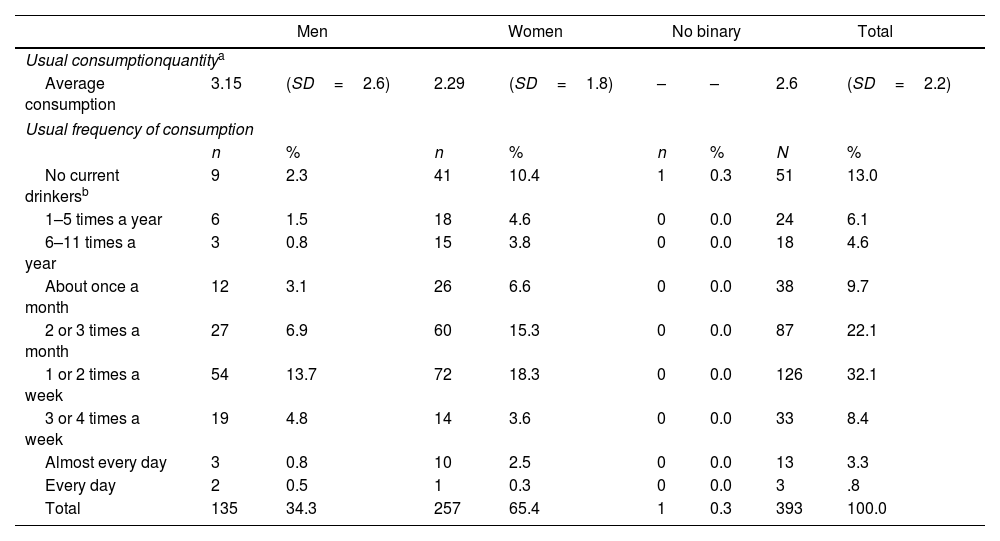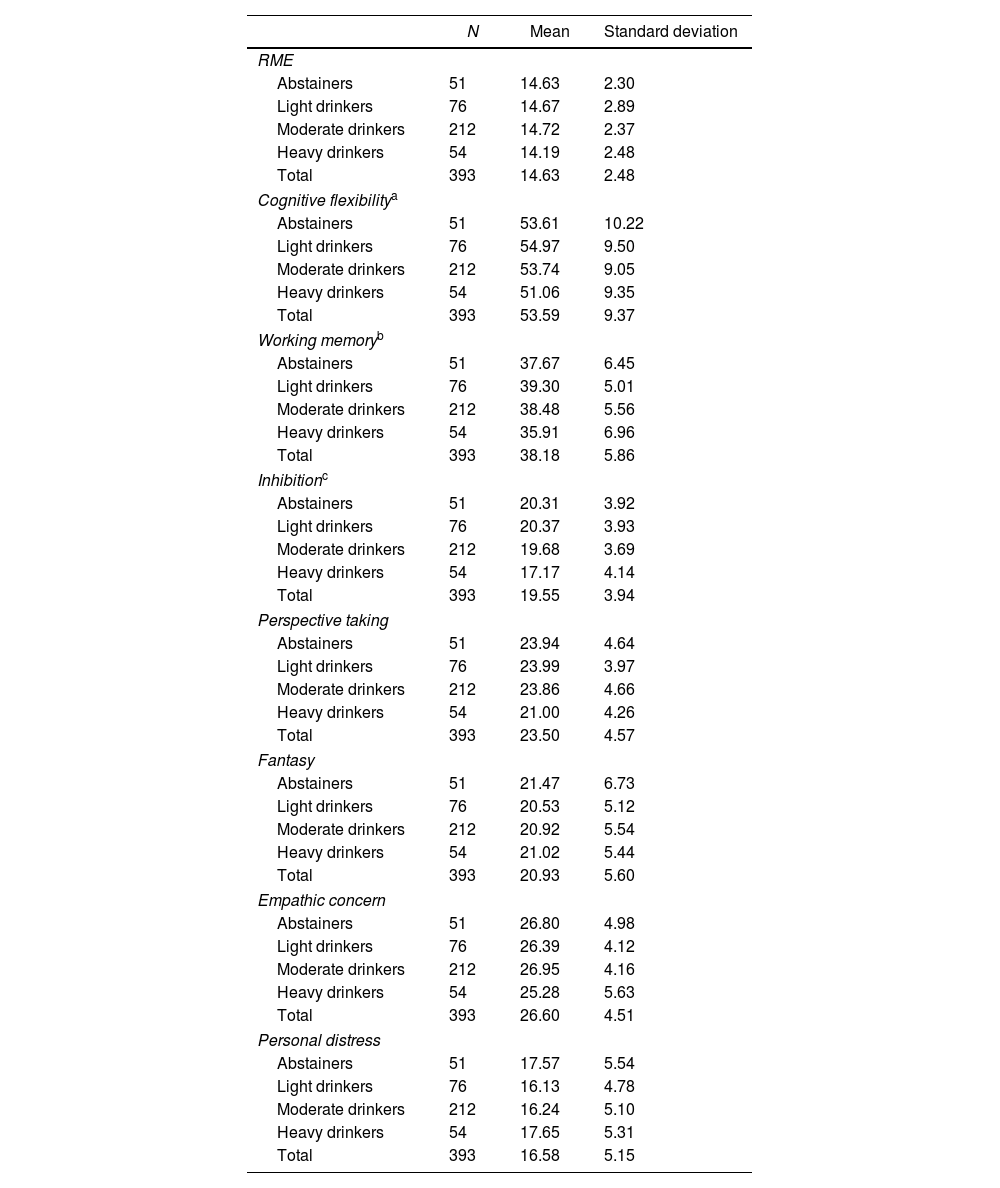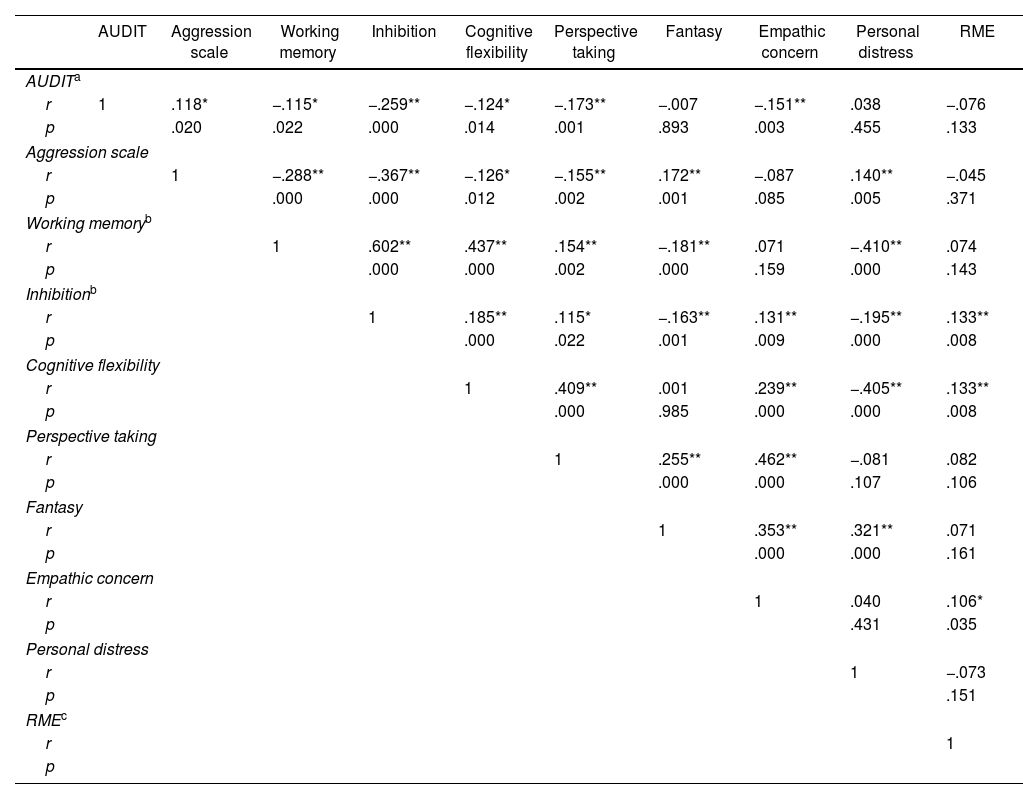Alcohol consumption has been linked to increased aggressiveness and to different types of violence. It has been suggested that both the empathic disposition and the executive function (EF) are mediators and moderators of aggression in alcoholic patients and during alcohol intoxication. In this work, we analyze the cognitive-affective profile that mediates or modulates the relationship between alcohol consumption and violence in social drinkers.
MethodsAn intentional sample of adults (aged 21–65; n=393) was assessed through an online platform. Usual alcohol consumption patterns were assessed and the following standardized instruments were included: Alcohol Use Disorders Identification Test (AUDIT); Interpersonal Reactivity Index (IRI) and Reading the Mind in the Eyes Test (RME), to assess dimensions of empathy; Adult Executive Inventory (ADEXI) and Cognitive Flexibility Scale (CFS), to assess dimensions of EF. The cognitive-affective profile of the participants, classified according to their usual alcohol consumption patterns, was analyzed through ANOVA. Following that, several models of the relationship between alcohol consumption, the cognitive-affective variables and violence were tested through Structural Equation Modeling (SEM).
ResultsSignificant differences were found among alcohol abstainers, light drinkers, moderate drinkers and heavy drinkers in the variables working memory F(3.389)=3.32; p=.022, inhibition F(3.389)=8.89; p<.000 and perspective taking F(3.389)=6.62; p<.000. According to the post hoc testing, the differences in working memory, inhibition and perspective taking were significant among the group of heavy drinkers and the other drinkers groups, but not between abstainers, light and moderate drinkers. The SEM which showed better fit was the one in which inhibition mediates or modulates the relationship between alcohol consumption and violence (CMIN/DF=1.890; CFI=926; RMSEA=.048).
ConclusionsThe deficit in cognitive functions, particularly in the inhibitory response, constitutes a key factor in understanding the violence linked to alcohol consumption and, in a more general way, the social conflicts among people who drink alcohol.
El consumo de alcohol se ha relacionado con una mayor agresividad y con diferentes tipos de violencia. Se ha sugerido que tanto la disposición empática como la función ejecutiva (FE) son mediadores y moderadores de la agresión en pacientes alcohólicos y durante la intoxicación alcohólica. En este trabajo analizamos el perfil cognitivo-afectivo que media o modula la relación entre consumo de alcohol y violencia en bebedores sociales.
MétodoSe entrevistó a una muestra intencional de adultos (21 a 65 años; n=393) a través de una plataforma en línea. Se evaluaron los patrones habituales de consumo de alcohol y se incluyeron los siguientes instrumentos estandarizados: Alcohol Use Disorders Identification Test (AUDIT); Interpersonal Reactivity Index (IRI) y Reading the Mind in the Eyes Test (RME), para evaluar dimensiones de empatía; Adult Executive Inventory (ADEXI) y Cognitive Flexibility Scale (CFS), para evaluar dimensiones de las FE. El perfil cognitivo-afectivo de los participantes, clasificados según sus patrones habituales de consumo de alcohol, se analizó mediante la escala ANOVA. Posteriormente, se probaron varios modelos de la relación entre el consumo de alcohol, las variables cognitivo-afectivas y la violencia a través de Modelos de Ecuaciones Estructurales (SEM).
ResultadosSe encontraron diferencias significativas entre abstemios, bebedores leves, bebedores moderados y bebedores fuertes en las variables Memoria de Trabajo F (3.389)=3.32; p=0,022, Inhibición F (3.389)=8,89; p<0,000 y Toma de Perspectiva F (3.389)=6,62; p<0,000. De acuerdo con las pruebas post hoc, las diferencias en Memoria de Trabajo, Inhibición y Toma de Perspectiva fueron significativas entre el grupo de bebedores fuertes y los otros grupos de bebedores, pero no entre abstemios, bebedores leves y bebedores moderados. El SEM que mostró mejor ajuste fue aquel en el que la Inhibición modula la relación entre el consumo de alcohol y la violencia (CMIN/DF=1.890; CFI=926; RMSEA=0,048).
ConclusionesEl déficit en las funciones cognitivas, particularmente en la respuesta inhibitoria, constituye un factor clave para comprender la violencia ligada al consumo de alcohol y, de manera más general, los conflictos sociales entre las personas que beben alcohol.
Artículo
Comprando el artículo el PDF del mismo podrá ser descargado
Precio 19,34 €
Comprar ahora










